- Home
- Beryl Kingston
Everybody's Somebody Page 8
Everybody's Somebody Read online
Page 8
She became aware that the long pinstriped legs of the maître d’ were standing right beside her, and she looked up at him thinking she would have to find the words to explain why she was sitting down but his face was so full of sympathy she burst into tears.
‘What is it?’ he said. ‘Can I help in any way?’
She held the letter out to him mutely and he took it and read it and pursed his lips. ‘You will want to travel as soon as possible,’ he said. ‘Leave it to me. I will see what can be arranged.’
Somebody gave her a cup of tea and a waitress rubbed her hands and presently the maître d’ came back to tell her that he’d changed her shift and she could catch the eleven o’clock train from Victoria that morning.
It was unreal to be sitting in a train. Unreal to be going home. Even when she was walking across the fields on her way to Binderton and could see the cottages in the distance, it was still unreal, as if it was happening in a dream. She couldn’t think what on earth she could say to poor Ma.
The cottage was unnaturally quiet. Tess and Edie and Johnnie were sitting together on the old sofa, looking unwashed and pale and tear stained.
‘I am glad you’ve come our Rosie,’ Tess said. ‘She’s upstairs. Mrs Taylor’s with her.’ She was clutching a soaking wet rag in her lap and her face was strained with grief.
Rosie climbed the stairs slowly, still struggling to think of something to say, but as soon as she walked into the bedroom, she knew there was no need for words at all. She sat on the edge of the bed and put her arms round her poor stricken mother and rocked her as if she were a child.
‘First our Tommy and now the baby,’ Maggie mourned. ‘It ent fair, our Rosie. It just ent fair. What did our Tommy ever do to deserve this? An’ young Charlie an’ all. An’ he only went because of our Tommy. It ent fair.’
‘I’ll be here for as long as you need me, Ma,’ Rosie promised. The maître d’ would understand.
She stayed for more than a week, running the house, cooking the meals, washing the dirty sheets and her siblings’ clothes and doing her best to comfort Ma and Pa, while Tess and Edie helped her whenever they could and wept on her shoulder whenever they couldn’t. The baby was buried in its pathetic white coffin early on Sunday morning and that evening, feeling she’d done all she could for the moment, Rosie said goodbye to her shattered family and caught the train to London. She felt as if she’d been away for a lifetime.
It was a little easier to be back in the familiar surroundings of the club, doing her usual work in her usual way. Grief terrorised her dreams and kept her wakeful in the small hours but at least there was a pattern to the days. It was only her half days off that presented a problem and that was because she didn’t know what to do with them. She drifted through the London streets, week after week, cocooned in grief and disbelief, discovering well-known landmarks without being moved by any of them. In Trafalgar Square she gazed at the height of the column and walked round the plinth from one stone lion to the next and drifted away. She traversed the length of the Mall in a shower of rain and circled the monument to the old queen and thought how stern and disagreeable she looked and drifted away from that too. Tommy was dead and nothing was real, nothing had substance, there was no meaning to anything.
Which was how she found herself in the middle of a demonstration without realising where she was.
She’d gone out one chilly October afternoon with a vague idea that she would take a look at the Charing Cross and was standing gazing vacantly at the elaborate stone tracery of it rising in front of Charing Cross station when she was jostled by a passer-by and looked round to find herself surrounded by a group of women all marching towards Trafalgar Square. They were a fierce-looking bunch in well-worn clothes, tatty hats and down-at-heel boots and they were carrying a huge banner that read ‘Human suffrage and no infringement of popular liberties’ which didn’t make much sense to her.
But then she became aware that there was a sizeable crowd of people standing on the pavement on both sides of the road, most of them women and all of them clapping and cheering and calling out to the marchers. ‘Votes for women!’, ‘God bless you!’, ‘Keep up the fight!’ and, ‘Good old Sylvia.’ And she realised that these marching women must be the suffragettes she’d been reading about in the papers and she looked at them again with greater understanding. One of the marchers, who was a most determined-looking young woman, was moving from side to side of the column so that she could shake hands with their supporters. They seemed very fond of her and clung to her hands. And then, as if in answer to some hidden signal, the marchers began to run and the crowd on the pavement ran with them and there was a headlong rush into Trafalgar Square with Rosie carried along in the middle of it, willy-nilly. Within seconds they reached the nearest plinth and began to climb up on it so that it was lined with women all waving to the crowd gathered and gathering below them. And the determined looking one began to make a speech.
Rosie couldn’t hear a word of it because there was such a din in the square, women shouting and cheering, motor buses and cars making their horrid roaring noises and sounding their horns and a group of red-faced men standing just north of the plinth shaking their fists and bellowing abuse. Their voices were so loud and angry she could hear everything they said. ‘Shut yer face!’ they roared, ‘Trollop!’, ‘Slag!’, ‘Stinkin’ whore!’ She watched them closely, ready to run if they got out of hand. They were hurling screwed up balls of paper at the platform. They came flying over the back of the nearest lion and burst into colour when they landed. The women on the platform were daubed with crude patches of red and yellow. That’s paint, Rosie thought and looked round wildly to see if she could push her way out of the crowd. The girl standing next to her had the same idea.
‘Stone me!’ she said. ‘They’re throwin’ paint at us. How dare they!’ And was struck on the side of the face by a missile full of red ochre. It stained her pale cheeks and fell into her hair and onto the collar of her jacket. ‘Oh fer cryin’ out loud!’
‘Don’t rub it,’ Rosie said. ‘It’ll brush off. Stand still an’ I’ll do it for you.’ She took her handkerchief out of her pocket and began to brush the powder away, flicking it delicately. She was concentrating so hard she didn’t notice the approach of the young man until his face was within inches of her own. Then she looked up to find that she was staring at a lion. Such a mane he had, escaping from underneath his cap and falling over his forehead, and such a broad nose and such eyes, almost as tawny as a real lion’s would have been but full of tender concern.
‘I can’t leave you fer a second, our kid,’ he said, putting a large hand on the girl’s shoulder. ‘Now what you been up to?’
She waved a vague hand at the crowd by the plinth. ‘It ain’t me, our Jim,’ she said. ‘It’s that lot over there. I never done nothink.’ And she appealed to Rosie. ‘Did I?’
He’d seen the yobs and the balls of paper and taken it all in before she could reply. ‘Leave it to me,’ he said to the girl. ‘I’ll soon ’ave them sorted out.’ And was gone, padding through the crowd in a leonine way, moving remarkably neatly and quickly for such a big man.
‘He will an’ all,’ the girl said, admiringly.
He picked his prey very neatly too, seizing the biggest of the bullies by the throat and pushing him backwards against the plinth. There was a brief struggle. Another man tried to intervene and was punched to the pavement, a third shouted obscenities and threw a couple of punches that didn’t land and then it was over, and the lion was walking back to them, rubbing his knuckles and looking pleased with himself.
‘That’s seen ’em off,’ he said. ‘Good job I come here. Time fer tea, our Kitty.’ And he gave Rosie a grin. ‘You an’ all, if you like.’
She followed them obediently. After all, if you get an invitation from the king of beasts, you don’t say no.
He took them to the Strand to a teashop called the Lyons Corner House, which seemed marvellously appropriate, and they were served t
ea and buns by a waitress in a black dress and an elaborate white cap with black ribbon threaded through it and sat at a long table with lots of other people who were all very friendly. By the time she’d drunk two cups of tea and eaten half her bun, Rosie had discovered that Kitty was a suffragette and a very ardent one and that she worked ‘in munitions’ and that the lion was her brother and a docker.
‘What’s ’ard grind I can tell yer,’ he said to Rosie and grinned at his sister. ‘Not that she’ll let me get a word in edgeways now she’s on about her suffragettes.’
‘Who was the woman what spoke?’ Rosie asked.
‘That’s Sylvia Pankhurst,’ Kitty said. ‘Ain’t she marvellous! She’ll get the vote for us if anyone will. I never see such a fighter. She says they should give the vote to everyone what’s serving in this war, soldiers, sailors, munition workers. Everyone. If you’re good enough to go out an’ risk gettin’ killed, you’re good enough to get the vote.’
Killed, Rosie thought. Oh dear God. Killed. The word clawed at her, tearing her chest with an onrush of grief, filling her throat. She put her face in her hands and wept with anguish.
Kitty was most upset. ‘What’ve I said?’ she asked, looking at her brother. ‘I didn’t mean… This is awful Jim.’
He put his arm round this poor weeping girl and silenced his sister with a quick shake of his head. ‘Someone you knew?’ he asked.
There was so much sympathy and kindness in his voice that Rosie told him. ‘My brother.’ And that made her cry even more.
‘Cry all you want,’ he said, looking at her bent head with an aching pity. ‘We’ll look after yer.’
She cried until there were no more tears. Then she felt a bit ashamed of herself, weeping like that in a public place, and looked up at him ready to apologise.
‘Don’t say nothink,’ he told her. ‘There ain’t no need. ’Appens to all of us.’ And when she’d wiped her eyes, he stopped cuddling her and finished his tea. ‘Tell yer what,’ he said. ‘Seems ter me you could do with a bit a’ cheerin’ up. How’d yer like to come to the music ’all?’
‘What’s that?’
‘What’s that?’ he echoed in feigned disbelief. ‘D’you mean ter say you never been to ’alls? Well stone me. We must put that ter rights. Don’t yer think so Kitty. What yer doin’ tonight?’
‘Well nothing much,’ Rosie admitted. ‘I usually just go back to the club.’
‘Then that’s settled,’ he said, standing up. ‘Come on. We’ll jest be in time fer the first ’ouse. It’s jest what you need.’
Put like that, how could she refuse?
Chapter 7
Despite its tear-stained start, that evening was one of the best that Rosie had ever spent in her life. Everything about it was perfect from her first open-mouthed sight of the amazing hall, all red and gold and blazing with gaslight, to the last triumphant song of a riotous evening. She sat between her two new friends, happy and safe among the hundreds in the hall and there wasn’t a toff in sight. All the men wore the same sort of clothes as Jim: cloth claps, work-worn jackets and ragged trousers, with bits of coloured cloth tied in a variety of knots around their throats, and they talked in the same London accent, sharp and quick. The women were dressed to the nines in feathery hats, embroidered blouses and their best skirts and jackets, which might be patched and darned but were being worn with determined style. Wafts of their cheap perfume mingled with the usual London smell of unwashed clothes and dust and sweat, and there was a feeling of happy excitement, even before the curtains opened.
And when they did, what treats were in store. First came a master of ceremonies, very grand in evening dress and smoking a big cigar, who introduced a succession of turns in the most extravagant language she’d ever heard — a magician in a spangled cloak who pulled eggs out of his mouth and his ears, several comedians, one with a dog that jumped along on its hind legs to rapturous applause, and lots of singers dressed in dazzling costumes. They all spoke with London accents too and sang about their lives, mocking the situation they were in and the way they were dealing with it.
One man sang about his ‘pretty little gardin’ and what a wonderful view it had, finishing with some gently ironic words that the audience were obviously waiting for.
‘Wiv a ladder an’ some glasses, you could see the ’Ackney Marshes, if it wasn’t fer the ’ouses in between.’
They clapped him for so long he had to sing it again and this time they all joined in.
‘Good?’ Jim said to Rosie, when the singer finally waved his hat at them and left the stage.
‘Wonderful,’ she told him, and it wasn’t an exaggeration.
‘You wait till the last act,’ he said grinning at her. ‘We got a real treat then.’
‘What is it?’ she asked.
‘It ain’t a what,’ Kitty told her. ‘It’s a who. It’s Marie Lloyd. Whatcher think a’ that? Marie Lloyd. Come ’ere special.’
Rosie said, ‘Oh,’ because she was obviously expected to say something and then added. ‘Who is she?’ because Kitty was waiting for her to say more.
Kitty was so shocked her eyebrows disappeared into her tawny fringe. ‘Who is she?’ she repeated. ‘Ain’tcher never heard a’ Marie Lloyd? Well stone me! She’s only the best thing on the ’alls.’
But there the conversation had to stop. The master of ceremonies was on his feet, flicking the ash from his cigar and beaming. ‘And now, Ladies and Gentleman, I give you the moment you’ve all been waiting for. I give you, the one and only, artfully, artistically amazing, musically masterful, mistress of sweet and saucy songs, our terpsichorean temptress, our own, our very own, Miss Marie Lloyd.’
The applause sang in Rosie’s ears like the roar of the sea. They were stamping their feet, whistling, cheering. And a short dark-haired woman with huge dark eyes strode out onto the stage, holding out her arms to them as if she was going to hug them all. She was wearing a very tight gown over a very tight corset, pretty shoes and a flamboyant hat topped with ostrich feathers that dipped and trembled as she moved, and she had a wonderfully cheeky expression on her face. Rosie liked her at once and when she started her first song her voice was so strong and extraordinary that she forgot about everything else — the war, Tommy’s death, her poor Ma, even her grief — and just gave herself up to the joy and shock of what she heard.
It had a catchy chorus that sounded almost innocent.
‘I always hold in havin’ it if you fancy it. If you fancy it, that’s understood. An’ suppose it makes you fat, I don’t worry over that, a little of what you fancy does you good.’
But the verses hinted at pleasures that Rosie wasn’t at all sure should even be talked about leave alone sung about on a public stage and that was amazing and scandalous. She could feel her cheeks growing hot at the ideas this Marie Lloyd was putting into her head. How could she be so bold? But wasn’t it wonderful that she could?
By the end of the evening, she cheered her new heroine so long and so loudly that her throat was sore.
‘Pie an’ mash an’ a pint,’ Jim said, taking her by the elbow.
‘Yes, please,’ she said. It was just what she needed. But when her belly was full, and her throat washed smooth with beer she began to feel guilty. She’d taken so much that evening and not offered to pay a penny. ‘Could I pay for the beer?’ she said when the second round arrived.
He grinned at her. ‘My treat,’ he said. ‘Like I told yer, I’m flush. What time you got to be back?’
She glanced at the clock on the wall and was horrified to see that she’d only got half an hour left. Where had the time gone?
‘Don’t worry,’ he said, when she told him. ‘I’ll get you there in plenty a’ time. Sup up.’
She tried to protest that she could make her own way back but there was no arguing with him. ‘Can’t have you wanderin’ about the streets a’ London on yer own this time a night,’ he said. ‘I’m takin’ you home an’ that’s that.’
They talked about
the music hall all the way back to Pall Mall. Rosie was enjoying it so much; it seemed no time at all before they were standing in front of the servants’ entrance at the club. Then she realised that this amazing evening was nearly over and felt quite cast down.
But Jim had a surprise for her that lifted her spirits at once. ‘There y’are,’ he said. ‘Home safe an’ sound. Same time next week?’
She was pleased to find that she could recover from her surprise quickly enough to find an answer. ‘All right,’ she said, ‘but only if I can pay my way.’
‘Quarter past seven at the tram stop,’ he said, gave her a grin and walked away.
She couldn’t linger to watch him go because she was afraid of being late in and she knew she was cutting it fine, but later that night, when she was on her own in her narrow bed and couldn’t get to sleep for thinking, she turned the whole evening over and over in her mind and wondered. Are we walking out? she thought. She could see why he’d invited her to the halls in the first place. It was because she’d been so upset, and he was being kind and trying to cheer her up. But to ask her out a second time felt different. Was it different?
It was a disappointment to her that it turned out to be exactly the same. He and Kitty met her at the tram stop, they all went to the music hall and were happily entertained, they ate pie and mash afterwards, all of which he paid for, and then he took her home and said, ‘Same time next week?’ just before he left her. All exactly the same. She tried to be sensible about it even though she was disappointed, telling herself that they’d hardly known one another any time at all and that he was a good friend and she ought to be satisfied with that. But she wasn’t satisfied and that night she dreamed of him, yet again, and this time he was kissing her the way she’d seen poor Charlie kissing that girl Millie, mouth against mouth and with his arms right round her. She woke in confusion, feeling ashamed of herself to be even thinking such things. It was downright immodest. She would have been surprised and encouraged if she’d known that her handsome lion had been dreaming very similar dreams.

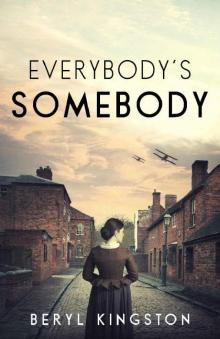 Everybody's Somebody
Everybody's Somebody Sixpenny Stalls
Sixpenny Stalls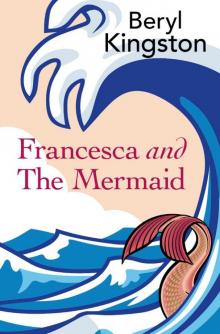 Francesca and the Mermaid
Francesca and the Mermaid Avalanche of Daisies
Avalanche of Daisies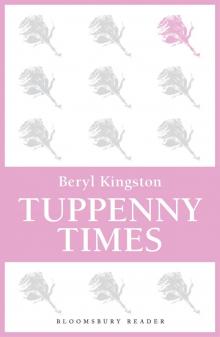 Tuppenny Times
Tuppenny Times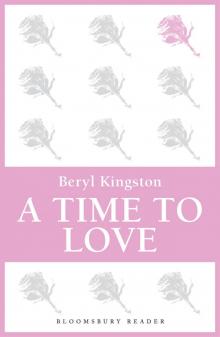 A Time to Love
A Time to Love Octavia's War
Octavia's War Gemma's Journey
Gemma's Journey London Pride
London Pride Gates of Paradise
Gates of Paradise Octavia
Octavia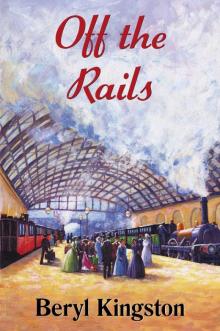 Off the Rails
Off the Rails Maggie's Boy
Maggie's Boy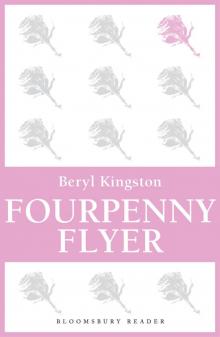 Fourpenny Flyer
Fourpenny Flyer